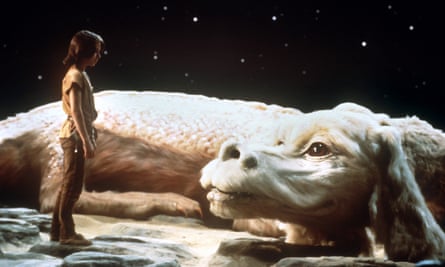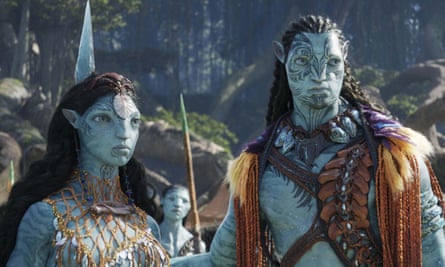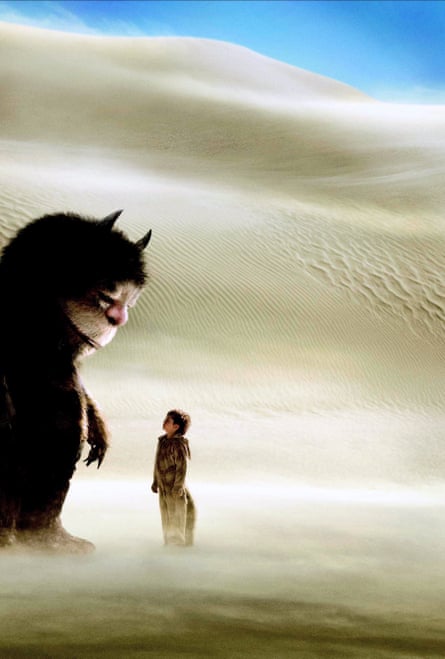Streaming: Roald Dahl’s Matilda the Musical and the best adaptations of classic children’s books | Roald Dahl
The common wisdom that “the book is usually better than the film” is as true of children’s literature as of its adult counterpart: cinema is stacked with adaptations of children’s classics that may be perfectly proficient, but haven’t the inspired individuality of the works at their source.
Devotees of Roald Dahl have learned this a lot over the years. His offbeat humour and offhand storytelling style, so irresistible to kids, rarely translates all the way to screen — it’s thwarted such titans as Steven Spielberg, who whiffed with The BFG (Netflix), though Wes Anderson’s droll Fantastic Mr Fox succeeded by inventing eccentricities of its own. Best of all, Nicolas Roeg’s very adult sense of the macabre proved a delicious fit for The Witches (Amazon Prime), notwithstanding a simplified, studio-mandated happy ending.
The somewhat clunkily titled Roald Dahl’s Matilda the Musical, which hits Netflix this weekend, falls somewhere in between: adapted from the hit stage musical, so already once removed from the text, it’s bright and lively and exuberantly performed, particularly by a thundering Emma Thompson as wicked headmistress Miss Trunchbull. That will secure it repeat play in many a household, though Matthew Warchus’s film dials down the book’s perverse darkness and melancholy. I prefer it to Danny DeVito’s broadly Americanised 1996 version, but a great screen Matilda eludes us still.
What are the children’s films, then, that stand up to the books they’re drawn from? Not a huge success when released, Spike Jonze’s beautiful, bittersweet adaptation of Maurice Sendak’s Where the Wild Things Are is a small miracle: a film that doesn’t stick to the letter of its source but to its roaming, curious spirit, with an intense interest in children and how they absorb and invent stories. Also on the more philosophical side: animator Mark Osborne’s loyal, loving stop-motion take on Antoine de Saint-Exupéry’s The Little Prince (Netflix), a text that has previously defeated film-makers who have tried to make it more narratively tidy. (A dreary musical version from the 1970s is best forgotten.) Osborne’s film trusts in young viewers to empathise with abstract ideas, to unpack metaphors for themselves.
Extravagant children’s fantasy is a challenge to film: the risk of cramping or negating readers’ vivid mental images is high. Films of Philip Pullman’s Northern Lights and CS Lewis’s Narnia books felt more dutiful than sparked by imagination; of the respectable Harry Potter films (which all landed on Netflix last month), I think only Alfonso Cuarón’s Harry Potter and the Prisoner of Azkaban takes flight independently of the book. (Years before, Cuarón delivered a ravishing, definitive version of Francis Hodgson Burnett’s A Little Princess; I’d trust him with any treasured volume.)
But I retain a fondness for German director Wolfgang Petersen’s mad, sometimes visionary 1984 adaptation of Michael Ende’s The NeverEnding Story, with its fearlessly nightmarish imagery and ornate world-building; and also anime legend Hayao Miyazaki’s swirling, fanciful take on Diane Wynne Jones’s Howl’s Moving Castle (Netflix). Still, the gold standard for applying one unique fantastical vision to another might be Czech auteur Jan Švankmajer’s jaggedly surrealist Alice (Amazon), a loose, feverish spin on Lewis Carroll, combining live action and expressionistic stop-motion. It won’t be for all children, but it’s richer than Disney’s various attempts.

Talking animals, a staple trope of children’s literature, can be harder to present on screen than on the page, though Paul King’s two Paddington films (BBC iPlayer) – already enjoying national-treasure status – and Babe, Chris Noonan’s wry Dick King-Smith adaptation, make it seem wholly natural. In animation, of course, the illusion is a little easier to pull off: see Don Bluth’s immersive rodent quest The Secret of NIMH or the noble rabbits of Martin Rosen’s exquisitely visceral, parental-guidance-very-much-required Watership Down.
Back in the real world, Lionel Jeffries’s beloved version of E Nesbit’s The Railway Children (BBC iPlayer) is most striking today for the modesty of its storytelling, as it trusts children’s interest in the everyday. Ditto Agnieszka Holland’s wonderful, stately telling of The Secret Garden, shorn of the needless sparkly fantasy applied to the more lavish 2020 version. Even among books for older children, few are adapted today with the perceptive tough-mindedness of Kes, Ken Loach’s unimprovable film of Barry Hines’s A Kestrel for a Knave – though recently, in a sea of mushy YA adaptations, George Tillman Jr’s The Hate U Give stood out for its integrity and ambition in presenting ugly adult realities to young viewers. It’s a rare and tricky balance to strike: in cinema, taking on children’s fiction definitely isn’t child’s play.
All titles are available to rent on multiple platforms unless otherwise specified
Also new on streaming and DVD

Avatar: The Way of Water
(Disney)
James Cameron’s watery mega-sequel finally comes to DVD and Blu-ray, though it’s hard to imagine how well it’ll play minus the eye-popping 3D of its cinema release – even on the big screen, the roving immersiveness of its underwater spectacle was doing a lot to cover for its thin, recycled story and one-ply characters.
God’s Creatures
(BFI)
Complex, anguished performances by Emily Watson, Paul Mescal and Aisling Franciosi are the standout virtue of this solemn Irish village drama, in which a prodigal son’s return to the fold aggravates lingering trauma in others. It’s handsome and absorbing, though missing the original, dynamic cinematic spirit of directors Anna Rose Holmer and Saela Davis’s previous film, The Fits.
Pacifiction
(New Wave)
Iconoclastic director Albert Serra obliquely tackles Tahiti’s legacy of colonialism in this meandering, gradually hypnotic study of a shady French official (a superb Benoît Magimel) wheeling and dealing his way around the island. Serra demands your patience, but rewards it with some dazzling, sensual coups de cinéma.
The common wisdom that “the book is usually better than the film” is as true of children’s literature as of its adult counterpart: cinema is stacked with adaptations of children’s classics that may be perfectly proficient, but haven’t the inspired individuality of the works at their source.
Devotees of Roald Dahl have learned this a lot over the years. His offbeat humour and offhand storytelling style, so irresistible to kids, rarely translates all the way to screen — it’s thwarted such titans as Steven Spielberg, who whiffed with The BFG (Netflix), though Wes Anderson’s droll Fantastic Mr Fox succeeded by inventing eccentricities of its own. Best of all, Nicolas Roeg’s very adult sense of the macabre proved a delicious fit for The Witches (Amazon Prime), notwithstanding a simplified, studio-mandated happy ending.

The somewhat clunkily titled Roald Dahl’s Matilda the Musical, which hits Netflix this weekend, falls somewhere in between: adapted from the hit stage musical, so already once removed from the text, it’s bright and lively and exuberantly performed, particularly by a thundering Emma Thompson as wicked headmistress Miss Trunchbull. That will secure it repeat play in many a household, though Matthew Warchus’s film dials down the book’s perverse darkness and melancholy. I prefer it to Danny DeVito’s broadly Americanised 1996 version, but a great screen Matilda eludes us still.
What are the children’s films, then, that stand up to the books they’re drawn from? Not a huge success when released, Spike Jonze’s beautiful, bittersweet adaptation of Maurice Sendak’s Where the Wild Things Are is a small miracle: a film that doesn’t stick to the letter of its source but to its roaming, curious spirit, with an intense interest in children and how they absorb and invent stories. Also on the more philosophical side: animator Mark Osborne’s loyal, loving stop-motion take on Antoine de Saint-Exupéry’s The Little Prince (Netflix), a text that has previously defeated film-makers who have tried to make it more narratively tidy. (A dreary musical version from the 1970s is best forgotten.) Osborne’s film trusts in young viewers to empathise with abstract ideas, to unpack metaphors for themselves.
Extravagant children’s fantasy is a challenge to film: the risk of cramping or negating readers’ vivid mental images is high. Films of Philip Pullman’s Northern Lights and CS Lewis’s Narnia books felt more dutiful than sparked by imagination; of the respectable Harry Potter films (which all landed on Netflix last month), I think only Alfonso Cuarón’s Harry Potter and the Prisoner of Azkaban takes flight independently of the book. (Years before, Cuarón delivered a ravishing, definitive version of Francis Hodgson Burnett’s A Little Princess; I’d trust him with any treasured volume.)
But I retain a fondness for German director Wolfgang Petersen’s mad, sometimes visionary 1984 adaptation of Michael Ende’s The NeverEnding Story, with its fearlessly nightmarish imagery and ornate world-building; and also anime legend Hayao Miyazaki’s swirling, fanciful take on Diane Wynne Jones’s Howl’s Moving Castle (Netflix). Still, the gold standard for applying one unique fantastical vision to another might be Czech auteur Jan Švankmajer’s jaggedly surrealist Alice (Amazon), a loose, feverish spin on Lewis Carroll, combining live action and expressionistic stop-motion. It won’t be for all children, but it’s richer than Disney’s various attempts.

Talking animals, a staple trope of children’s literature, can be harder to present on screen than on the page, though Paul King’s two Paddington films (BBC iPlayer) – already enjoying national-treasure status – and Babe, Chris Noonan’s wry Dick King-Smith adaptation, make it seem wholly natural. In animation, of course, the illusion is a little easier to pull off: see Don Bluth’s immersive rodent quest The Secret of NIMH or the noble rabbits of Martin Rosen’s exquisitely visceral, parental-guidance-very-much-required Watership Down.
Back in the real world, Lionel Jeffries’s beloved version of E Nesbit’s The Railway Children (BBC iPlayer) is most striking today for the modesty of its storytelling, as it trusts children’s interest in the everyday. Ditto Agnieszka Holland’s wonderful, stately telling of The Secret Garden, shorn of the needless sparkly fantasy applied to the more lavish 2020 version. Even among books for older children, few are adapted today with the perceptive tough-mindedness of Kes, Ken Loach’s unimprovable film of Barry Hines’s A Kestrel for a Knave – though recently, in a sea of mushy YA adaptations, George Tillman Jr’s The Hate U Give stood out for its integrity and ambition in presenting ugly adult realities to young viewers. It’s a rare and tricky balance to strike: in cinema, taking on children’s fiction definitely isn’t child’s play.
All titles are available to rent on multiple platforms unless otherwise specified
Also new on streaming and DVD

Avatar: The Way of Water
(Disney)
James Cameron’s watery mega-sequel finally comes to DVD and Blu-ray, though it’s hard to imagine how well it’ll play minus the eye-popping 3D of its cinema release – even on the big screen, the roving immersiveness of its underwater spectacle was doing a lot to cover for its thin, recycled story and one-ply characters.
God’s Creatures
(BFI)
Complex, anguished performances by Emily Watson, Paul Mescal and Aisling Franciosi are the standout virtue of this solemn Irish village drama, in which a prodigal son’s return to the fold aggravates lingering trauma in others. It’s handsome and absorbing, though missing the original, dynamic cinematic spirit of directors Anna Rose Holmer and Saela Davis’s previous film, The Fits.
Pacifiction
(New Wave)
Iconoclastic director Albert Serra obliquely tackles Tahiti’s legacy of colonialism in this meandering, gradually hypnotic study of a shady French official (a superb Benoît Magimel) wheeling and dealing his way around the island. Serra demands your patience, but rewards it with some dazzling, sensual coups de cinéma.
